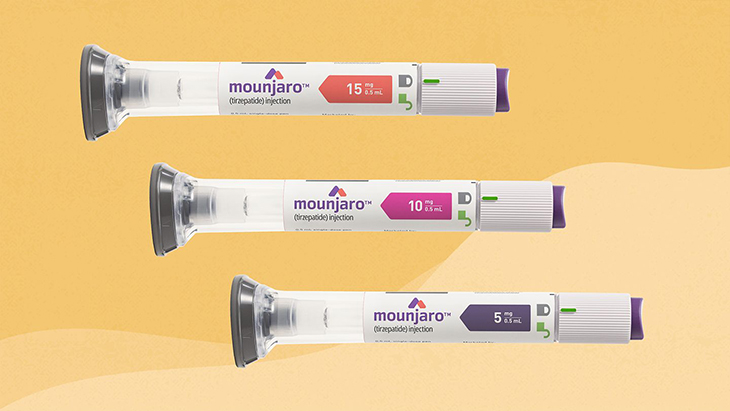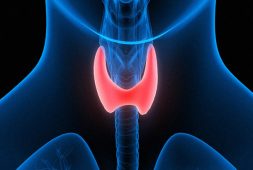Mounjaro Medication On Shortlist For FDA Approval As Potential New Drug For Obesity And Overweight

Many people that struggle with obesity are constantly looking for ways to lose weight. Just recently, the diabetes medication called Mounjaro (tirzepatide), which is approved by the U.S. Food and Drug Administration (FDA), is now edging closer to becoming an authorized treatment for adults dealing with obesity and being overweight.
In a recent announcement dated April 27, 2023, by Eli Lilly, the drug’s manufacturer, it was revealed that Mounjaro demonstrated promising results in the SURMOUNT-2 trial – the second phase 3 clinical trial for chronic weight management. Over the course of 18 months, individuals with diabetes participating in the trial achieved a remarkable reduction of nearly 16 percent in their body weight, equivalent to an average weight loss of approximately 34 pounds.
Jeff Emmick, MD, PhD, the senior vice president of product development at Lilly, said in the statement, “Obesity is a difficult-to-manage disease, and it’s even more difficult for people living with type 2 diabetes. The degree of mean weight reduction seen in SURMOUNT-2 has not been previously achieved in phase 3 trials for obesity or overweight and type 2 diabetes.”
What Do We Know About Mounjaro?
This trial focused specifically on adults dealing with type 2 diabetes accompanied by obesity or being overweight. Fatima Cody Stanford, MD, MPH, an associated professor of medicine at Harvard Medical School and an obesity medicine physician scientist at Massachusetts General Hospital, remarked that this study reinforces prior observations related to tirzepatide.
“These findings aren’t surprising, since we’ve seen really great results with this drug in patients with type 2 diabetes,” says Dr. Stanford.
Mounjaro, a member of the glucagon-like peptide-1 (GLP-1) agonist class of medications, gained its initial FDA approval in May 2022. This class also includes semaglutide (marketed as Ozempic), and FDA-approved weight loss drug for type 2 diabetes (T2D).
Both tirzepatide and semaglutide are administered through self-injection beneath the skin of the abdomen, thigh, or upper arm on a weekly basis.
In the earlier phase 3 trial called SURMOUNT-1, which investigated Mounjaro’s efficacy and safety among individuals with overweight or obesity but without diabetes, substantial weight loss results were achieved. Participants in that trial experienced weight reductions of up to 22.5 percent of their initial body weight.
The average total weight loss was higher in the earlier trial in people without T2D, which is to be expected, says Stanford.
Dr. Standford explains that, as expected, the average total weight loss was higher in the earlier trial in those without T2D. She says, “We see this consistently. Although metabolic or bariatric surgery and pharmacotherapy are effective in people with diabetes, they typically don’t respond as well as people without diabetes.”
‘Game Changing’ Weight Loss Results with Mounjaro
The latest trial involved 938 adult participants struggling with obesity or being overweight with type 2 diabetes. In combination a reduced-calorie diet and increased physical activity, participants were administered either 10 milligrams (mg) or 15 mg of Mounjaro, compared to a placebo.
Participants had a ‘mean baseline body weight of 222 pounds (lb) and a baseline A1C of 8.0 percent.’
On either dose, over 80 percent of participants managed to shed 5 percent or more of their body weight. The weight reduction percentages were 13.4 percent (29.8 pounds (lb) or 13.5 kilograms (kg) on 10 mg and 15.7 percent (34 lb or 15 kg) on 15 mg compared to placebo.
Meanwhile, reductions in A1C as compared with the placebo were similar to what they found in the clinical trials done on the drug and type 2 diabetes treatment.
New Trial Results Solidify Efficacy of Tirzepatide for Obesity and Overweight
However, it’s essential to note that Mounjaro carries a cautionary note regarding the potential risk of thyroid C-cell tumors, based on findings in rat studies. While it’s unknown whether this risk extends to humans, the medication is not recommended for individuals with a history of medullary thyroid cancer or multiple endocrine neoplasia syndrome type 2.
Section chief of minimally invasive and bariatric surgery at Stanford University in Palo Alto, California, Dan Azagury, MD, he explained that the findings were similar to what was seen in earlier trials of the medication for those with T2D. Notably, Dr. Azagury was not involved in the study.
“That had led to its FDA approval for use in diabetes. But the weight loss results were game changing in that trial already. This is a study for the FDA; it’s necessary to get the indication for use to treat obesity. But [it’s] nothing very new scientifically — more a confirmation of what we all knew,” says Dr. Azagury.
Safety and Side Effects of Mounjaro
Despite the encouraging results, the safety profile of tirzepatide remained consistent with earlier trials.
Dr. Stanford shares, “As we would expect, GI issues are going to be the most common side effects. This is common among this category of medicines.”
Common side effects such as gastrointestinal issues were reported, including nausea, diarrhea, vomiting, and constipation. These side effects were generally mild to moderate in severity and primarily occurred during the dose escalation phase.
“The discontinuation rates (how many people dropped out before the trial ended) are relatively low, especially in a trial like this in this population,” she says.
The drug also carries a warning risk for thyroid C-cell tumors, since Mounjaro causes thyroid C-cell tumors in rats. However, what’ not known is whether the drug causes such tumors, including that of medullary thyroid cancer, in humans.
As for the prescribing information, Mounjaro shouldn’t be sued in those with personal or family history of medullary thyroid cancer, or in those with multiple endocrine neoplasia syndrome type 2.
Will FDA Approval Provide Easy Access to Mounjaro?
Dr. Azagury says that physicians already knew that the drug could be used off-label to treat obesity. “This new study opens the door to its approval by the FDA. In turn, it will hopefully lead to broader insurance reimbursement. That’s the main barrier we face now: The drugs work; our patients need them. But they can’t get access because the cost is prohibitive, and insurance won’t cover it,” he says.
He also says that the sad reality is that it will impact patients that fall under a lower socioeconomic status, more than others at least, increasing health inequities. That’s because they tend to get impacted by this disease more while being denied access to treatment too.
The drug’s list price is approximately $1,023.04 per fill, equating to over $50,000 annually without insurance coverage.
Dr. Stanford agrees that coverage is key. “If you can’t get access to the medicine, it’s like a shiny ornament on a shelf that you can’t reach. That doesn’t help me or my patients. If a lot of people can’t get it — or if they get approved initially and then after three months they’re rejected from approval — imagine how discouraging that is,” she says.
The weight loss that comes with Mounjaro and other drugs in this class can be life-changing, shares Dr. Stanford. “This isn’t about how someone looks — it’s improving their entire cardiometabolic health,” she says.
Just like with other chronic disease treatments, patients need to remain on Mounjaro throughout their lifetime to treat both diabetes and obesity or being overweight.
FDA Approval to Treat Obesity and Overweight Possible By End of 2023
Eli Lilly plans to continue its “rolling” submission of the drug for approval for individuals with obesity or overweight and weight-related comorbidities. This process, according to the agency, is part of the “fast track” approval mechanism, which aims to expedite new drug availability to patients. It allows sections of the new drug application to be submitted to the FDA as they are completed.
Just last December 2022, Mounjaro was included in the FDA’s drug shortage list. If it gets approved for overweight and obesity, the demand will become even more.
As per Reuters, the company is optimistic about receiving FDA approval by late 2023 and intends to double its manufacturing capacity by the end of this year.



